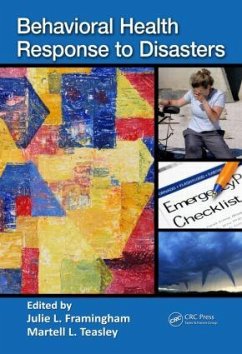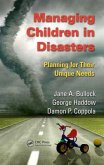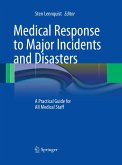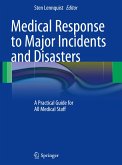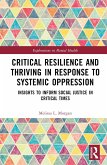Behavioral Health Response to Disasters
Herausgeber: Framingham, Julie; Teasley, Martell L
Behavioral Health Response to Disasters
Herausgeber: Framingham, Julie; Teasley, Martell L
- Gebundenes Buch
- Merkliste
- Auf die Merkliste
- Bewerten Bewerten
- Teilen
- Produkt teilen
- Produkterinnerung
- Produkterinnerung
Examining the current organizational structure of disaster behavioral health services, this book focuses on culture, race, ethnicity, gender, socioeconomic status, and age as factors to incorporate within treatment modalities and service delivery systems to provide efficacious and culturally competent short-term and long-term care and treatment for disaster survivors. The book not only heightens awareness of culturally competent care, but also provides valuable training on how conduct interventions to meet the psychological needs of survivors from diverse backgrounds.
Andere Kunden interessierten sich auch für
![Managing Children in Disasters Managing Children in Disasters]() Jane A BullockManaging Children in Disasters197,99 €
Jane A BullockManaging Children in Disasters197,99 €![Human Security and Natural Disasters Human Security and Natural Disasters]() Human Security and Natural Disasters196,99 €
Human Security and Natural Disasters196,99 €![Medical Response to Major Incidents and Disasters Medical Response to Major Incidents and Disasters]() Medical Response to Major Incidents and Disasters67,99 €
Medical Response to Major Incidents and Disasters67,99 €![Medical Response to Major Incidents and Disasters Medical Response to Major Incidents and Disasters]() Medical Response to Major Incidents and Disasters98,99 €
Medical Response to Major Incidents and Disasters98,99 €![Government Accountability and Legislative Oversight Government Accountability and Legislative Oversight]() Riccardo PelizzoGovernment Accountability and Legislative Oversight188,99 €
Riccardo PelizzoGovernment Accountability and Legislative Oversight188,99 €![Disasters and Mental Health Disasters and Mental Health]() Mario MajDisasters and Mental Health215,99 €
Mario MajDisasters and Mental Health215,99 €![Critical Resilience and Thriving in Response to Systemic Oppression Critical Resilience and Thriving in Response to Systemic Oppression]() Melissa L MorganCritical Resilience and Thriving in Response to Systemic Oppression174,99 €
Melissa L MorganCritical Resilience and Thriving in Response to Systemic Oppression174,99 €-
-
-
Examining the current organizational structure of disaster behavioral health services, this book focuses on culture, race, ethnicity, gender, socioeconomic status, and age as factors to incorporate within treatment modalities and service delivery systems to provide efficacious and culturally competent short-term and long-term care and treatment for disaster survivors. The book not only heightens awareness of culturally competent care, but also provides valuable training on how conduct interventions to meet the psychological needs of survivors from diverse backgrounds.
Hinweis: Dieser Artikel kann nur an eine deutsche Lieferadresse ausgeliefert werden.
Hinweis: Dieser Artikel kann nur an eine deutsche Lieferadresse ausgeliefert werden.
Produktdetails
- Produktdetails
- Verlag: Taylor & Francis
- Seitenzahl: 442
- Erscheinungstermin: 23. April 2012
- Englisch
- Abmessung: 251mm x 175mm x 30mm
- Gewicht: 798g
- ISBN-13: 9781439821237
- ISBN-10: 1439821232
- Artikelnr.: 32906636
- Herstellerkennzeichnung
- Libri GmbH
- Europaallee 1
- 36244 Bad Hersfeld
- gpsr@libri.de
- Verlag: Taylor & Francis
- Seitenzahl: 442
- Erscheinungstermin: 23. April 2012
- Englisch
- Abmessung: 251mm x 175mm x 30mm
- Gewicht: 798g
- ISBN-13: 9781439821237
- ISBN-10: 1439821232
- Artikelnr.: 32906636
- Herstellerkennzeichnung
- Libri GmbH
- Europaallee 1
- 36244 Bad Hersfeld
- gpsr@libri.de
Julie L. Framingham, MSW, has an extensive background in writing disaster grants and managing large federally funded disaster behavioral health recovery projects that have provided crisis counseling, clinical interventions, and case management services for hurricane and tornado survivors. She was the director of the SAMHSA-funded Project Recovery and the FEMA-funded Project H.O.P.E. (Helping Our People in Emergencies) in Florida from 2005 through 2008. Each of the programs managed represented either new approaches to supporting survivors or a paradigm shift toward more evidenced-based technologies for dealing with the reactions to traumatic events. She has made numerous presentations at state and national conferences on disaster behavioral health, and she has served as a consultant and trainer for the Substance Abuse and Mental Health Services Administration's Disaster Technical Assistance Center. Ms. Framingham also has collaborated with the National Center for Posttraumatic Stress Disorder, the National Child Traumatic Stress Network, and the Administration for Children and Families to develop new approaches to mental health intervention and case management services for disaster survivors. Martell L. Teasley, PhD , is an associate professor and chair of the Social Work and Disaster Recovery Certificate Program at Florida State University College of Social Work. Part of his research agenda includes a focus on disaster relief and recovery with a particular emphasis on cultural competence and vulnerable populations. Dr. Teasley works with several faith-based organizations in educating and training disaster case managers and paraprofessionals. This includes the evaluation of case management practices and emergency management organizational readiness assessments. He has served as a consultant for the Administration for Children and Families on the development of national case management standards and presented both nationally and internationally on disaster planning, relief, and recovery.
Overview of the History and Fundamental Concepts behind Disaster Behavioral
Health. Past Disaster Experiences and Behavioral Health Outcomes. Disaster
Behavioral Health Outreach: A Nontraditional Approach to Assisting
Survivors. Organizational Response to Disasters and Key Partners.
Governmental Roles and Responsibilities in Disaster Behavioral Health
Response and Recovery. Nongovernmental Organizations Responding to
Disasters in the United States. Disaster Mental Health: A Public Health
Paradigm. Psychological Resilience and Pathological Responses to Disaster.
Coping with Loss and Overcoming Trauma. Mental Health Outcomes of Disasters
and Terrorism. At-Risk Populations, Disaster Risk Factors, and Individual
and Community Vulnerability. Disaster Behavioral Health for Children and
Adolescents: Best Practices for Preparedness, Response, and Recovery.
Disaster Behavioral Health and Older Adults: American and Canadian
Readiness and Response. Cultural Competence in Behavioral Health Disaster
Response: The Challenge, the Opportunity. Helping the Helpers: Ameliorating
Secondary Traumatic Stress in Disaster Workers. Understanding Climatic,
Geographic, and Topographic Considerations for Assessing Disaster
Vulnerability. Addressing Barriers within Systems of Care. Disaster
Vulnerability and the School Setting: Understanding Environmental Risk and
Implications for Behavioral Health Response. Issues in Providing Mental and
Medical Health Care in Long-Term Care Settings during Disasters. Delivery
of Behavioral Health Services in General and Functional Needs Shelters.
Disaster Behavioral Health Interventions. Initial Behavioral Health
Response: The Conundrums of a State Crisis Counseling Program. Long-Term
Mental Health Treatment for Adult Disaster Survivors. Disaster and
Substance Abuse Services. Understanding Disaster Recovery Case Management
and Behavioral Health: A Review of Research. Leaving a Legacy: Training and
Community Empowerment. Disaster Mental Health Services: Implementation,
Training, and Sustainability. The Role of Social Marketing in Developing
Disaster Behavioral Health Programs. Planning for Disaster: A Behavioral
Health Perspective.
Health. Past Disaster Experiences and Behavioral Health Outcomes. Disaster
Behavioral Health Outreach: A Nontraditional Approach to Assisting
Survivors. Organizational Response to Disasters and Key Partners.
Governmental Roles and Responsibilities in Disaster Behavioral Health
Response and Recovery. Nongovernmental Organizations Responding to
Disasters in the United States. Disaster Mental Health: A Public Health
Paradigm. Psychological Resilience and Pathological Responses to Disaster.
Coping with Loss and Overcoming Trauma. Mental Health Outcomes of Disasters
and Terrorism. At-Risk Populations, Disaster Risk Factors, and Individual
and Community Vulnerability. Disaster Behavioral Health for Children and
Adolescents: Best Practices for Preparedness, Response, and Recovery.
Disaster Behavioral Health and Older Adults: American and Canadian
Readiness and Response. Cultural Competence in Behavioral Health Disaster
Response: The Challenge, the Opportunity. Helping the Helpers: Ameliorating
Secondary Traumatic Stress in Disaster Workers. Understanding Climatic,
Geographic, and Topographic Considerations for Assessing Disaster
Vulnerability. Addressing Barriers within Systems of Care. Disaster
Vulnerability and the School Setting: Understanding Environmental Risk and
Implications for Behavioral Health Response. Issues in Providing Mental and
Medical Health Care in Long-Term Care Settings during Disasters. Delivery
of Behavioral Health Services in General and Functional Needs Shelters.
Disaster Behavioral Health Interventions. Initial Behavioral Health
Response: The Conundrums of a State Crisis Counseling Program. Long-Term
Mental Health Treatment for Adult Disaster Survivors. Disaster and
Substance Abuse Services. Understanding Disaster Recovery Case Management
and Behavioral Health: A Review of Research. Leaving a Legacy: Training and
Community Empowerment. Disaster Mental Health Services: Implementation,
Training, and Sustainability. The Role of Social Marketing in Developing
Disaster Behavioral Health Programs. Planning for Disaster: A Behavioral
Health Perspective.
Overview of the History and Fundamental Concepts behind Disaster Behavioral
Health. Past Disaster Experiences and Behavioral Health Outcomes. Disaster
Behavioral Health Outreach: A Nontraditional Approach to Assisting
Survivors. Organizational Response to Disasters and Key Partners.
Governmental Roles and Responsibilities in Disaster Behavioral Health
Response and Recovery. Nongovernmental Organizations Responding to
Disasters in the United States. Disaster Mental Health: A Public Health
Paradigm. Psychological Resilience and Pathological Responses to Disaster.
Coping with Loss and Overcoming Trauma. Mental Health Outcomes of Disasters
and Terrorism. At-Risk Populations, Disaster Risk Factors, and Individual
and Community Vulnerability. Disaster Behavioral Health for Children and
Adolescents: Best Practices for Preparedness, Response, and Recovery.
Disaster Behavioral Health and Older Adults: American and Canadian
Readiness and Response. Cultural Competence in Behavioral Health Disaster
Response: The Challenge, the Opportunity. Helping the Helpers: Ameliorating
Secondary Traumatic Stress in Disaster Workers. Understanding Climatic,
Geographic, and Topographic Considerations for Assessing Disaster
Vulnerability. Addressing Barriers within Systems of Care. Disaster
Vulnerability and the School Setting: Understanding Environmental Risk and
Implications for Behavioral Health Response. Issues in Providing Mental and
Medical Health Care in Long-Term Care Settings during Disasters. Delivery
of Behavioral Health Services in General and Functional Needs Shelters.
Disaster Behavioral Health Interventions. Initial Behavioral Health
Response: The Conundrums of a State Crisis Counseling Program. Long-Term
Mental Health Treatment for Adult Disaster Survivors. Disaster and
Substance Abuse Services. Understanding Disaster Recovery Case Management
and Behavioral Health: A Review of Research. Leaving a Legacy: Training and
Community Empowerment. Disaster Mental Health Services: Implementation,
Training, and Sustainability. The Role of Social Marketing in Developing
Disaster Behavioral Health Programs. Planning for Disaster: A Behavioral
Health Perspective.
Health. Past Disaster Experiences and Behavioral Health Outcomes. Disaster
Behavioral Health Outreach: A Nontraditional Approach to Assisting
Survivors. Organizational Response to Disasters and Key Partners.
Governmental Roles and Responsibilities in Disaster Behavioral Health
Response and Recovery. Nongovernmental Organizations Responding to
Disasters in the United States. Disaster Mental Health: A Public Health
Paradigm. Psychological Resilience and Pathological Responses to Disaster.
Coping with Loss and Overcoming Trauma. Mental Health Outcomes of Disasters
and Terrorism. At-Risk Populations, Disaster Risk Factors, and Individual
and Community Vulnerability. Disaster Behavioral Health for Children and
Adolescents: Best Practices for Preparedness, Response, and Recovery.
Disaster Behavioral Health and Older Adults: American and Canadian
Readiness and Response. Cultural Competence in Behavioral Health Disaster
Response: The Challenge, the Opportunity. Helping the Helpers: Ameliorating
Secondary Traumatic Stress in Disaster Workers. Understanding Climatic,
Geographic, and Topographic Considerations for Assessing Disaster
Vulnerability. Addressing Barriers within Systems of Care. Disaster
Vulnerability and the School Setting: Understanding Environmental Risk and
Implications for Behavioral Health Response. Issues in Providing Mental and
Medical Health Care in Long-Term Care Settings during Disasters. Delivery
of Behavioral Health Services in General and Functional Needs Shelters.
Disaster Behavioral Health Interventions. Initial Behavioral Health
Response: The Conundrums of a State Crisis Counseling Program. Long-Term
Mental Health Treatment for Adult Disaster Survivors. Disaster and
Substance Abuse Services. Understanding Disaster Recovery Case Management
and Behavioral Health: A Review of Research. Leaving a Legacy: Training and
Community Empowerment. Disaster Mental Health Services: Implementation,
Training, and Sustainability. The Role of Social Marketing in Developing
Disaster Behavioral Health Programs. Planning for Disaster: A Behavioral
Health Perspective.

